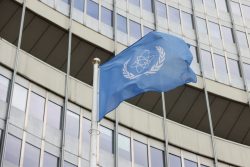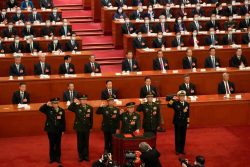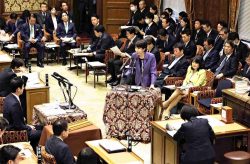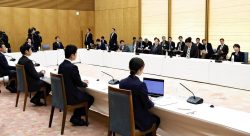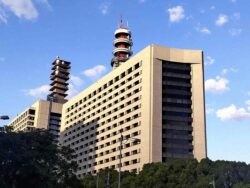UN Peacekeepers in Southern Lebanon Are in the Crosshairs of Israel’s War on Hezbollah
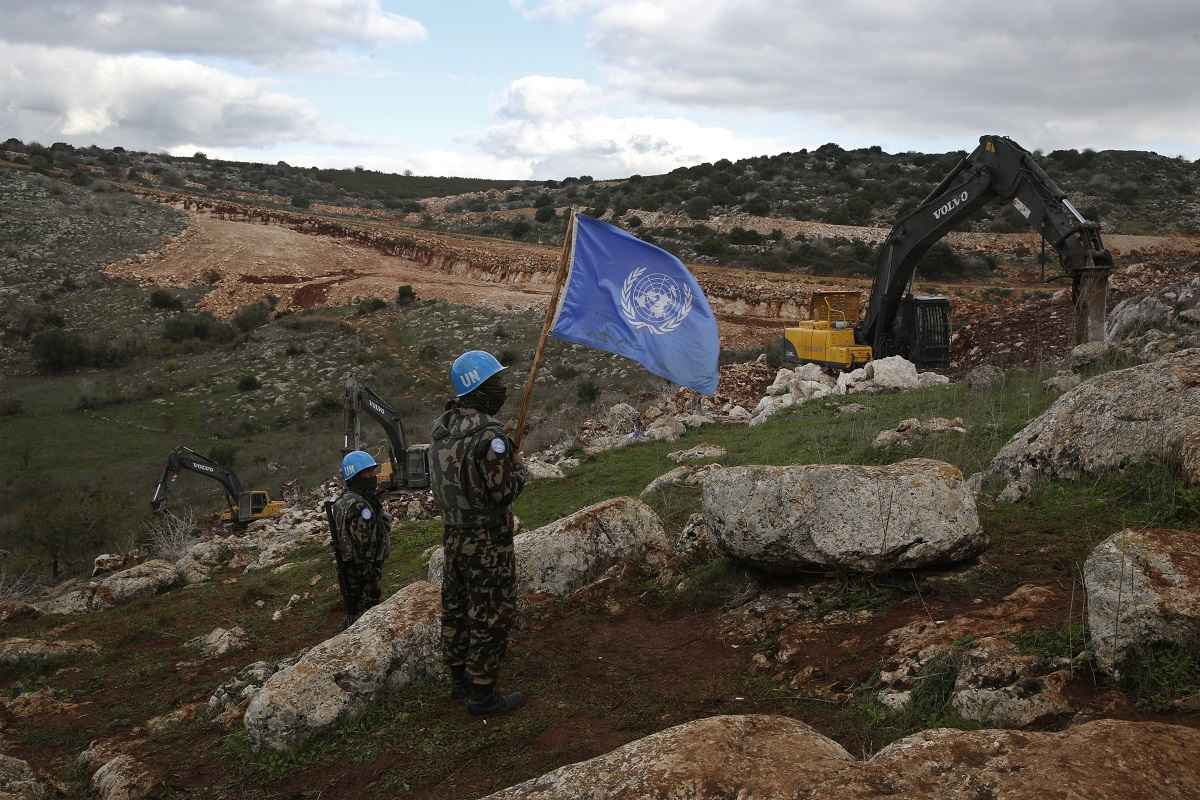
UN peacekeepers hold their flag, as they observe Israeli excavators attempt to destroy tunnels built by Hezbollah, near the southern Lebanese-Israeli border village of Mays al-Jabal, Lebanon, Dec. 13, 2019.
11:57 JST, October 14, 2024
BEIRUT (AP) — The U.N. peacekeeping mission in southern Lebanon said Israeli tanks “forcibly entered” one of its positions on Sunday, as Israeli Prime Minister Benjamin Netanyahu demanded it leave the area.
International criticism is growing after Israeli forces have repeatedly fired on U.N. peacekeepers since the start of its ground operation in Lebanon. Five peacekeepers have been wounded in attacks that struck their positions in recent days, most of them blamed on Israeli forces.
As Israel escalates its ground invasion against Hezbollah militants in southern Lebanon, the 10,000-strong peacekeeping force is increasingly in the crosshairs.
Relations have worsened between Israel and the United Nations over the way Israel has conducted its war in Gaza. In an unprecedented move, Israel earlier this month said the U.N. secretary-general was persona non grata in Israel.
The spokesman for U.N. Secretary-General António Guterres called Sunday’s events “deeply worrying.” Netanyahu called for UNIFIL to heed Israel’s warnings to evacuate, accusing them of “providing a human shield” to Hezbollah.
Here’s a look at the U.N. force and the latest developments:
What is UNIFIL?
The U.N. Interim Force in Lebanon was created in 1978 to oversee the withdrawal of Israeli troops after Israel invaded and occupied southern Lebanon. Israel invaded again in 1982, and it wasn’t until 2000 that it withdrew.
In the absence of an agreed-upon border, the U.N. drew up a boundary between Lebanon and Israel known as the Blue Line, which UNIFIL monitors and patrols.
The United Nations expanded UNIFIL’s mission following the monthlong 2006 war between Israel and Hezbollah, allowing peacekeepers to deploy along the Israeli border to monitor the cessation of hostilities and patrol a buffer zone along the border.
The force currently has around 10,000 peacekeepers in southern Lebanon drawn from around 50 countries. They patrol, monitor and report violations of U.N. Security Council Resolution 1701, which ended the 2006 fighting. The force also provides support to local communities.
What are the latest developments?
Tensions have been mounting since Israel launched its ground invasion of Lebanon earlier this month. Israel asked UNIFIL to move its personnel further north, and the peacekeeping force refused.
On Thursday, UNIFIL said an Israeli tank “directly” fired on its headquarters in the town of Naqoura, knocking down an observation tower and injuring two Indonesian peacekeepers. It said its headquarters and nearby positions “have been repeatedly hit” and Israel “deliberately” fired on and disabled the headquarters’ monitoring cameras.
On Friday, UNIFIL said new explosions hit its headquarters, injuring two peacekeepers, although it did not directly blame Israel. It also said an Israeli army bulldozer hit the perimeter of another position in southern Lebanon while Israeli tanks moved nearby.
On Saturday, UNIFIL said its headquarters in Naqoura was hit again, with a peacekeeper struck by gunfire late Friday and in stable condition. It wasn’t clear who fired.
On Sunday, UNIFIL said two Israeli tanks broke into a base and later fired smoke rounds near peacekeepers there. It said 15 U.N. peacekeepers had skin irritation and gastrointestinal reactions. The Israeli troops stayed for 45 minutes, putting the mission in danger, the statement said.
What has Israel said?
The Israeli army has expressed deep concern over Thursday’s incident and said it is conducting a thorough review at the highest levels of command. On Friday, it said its soldiers were responding with fire to an immediate threat against them. It didn’t respond to questions Saturday.
On Sunday, Israel’s military said a tank trying to evacuate wounded soldiers backed into a U.N. post while under fire. It said a smoke screen was used to provide cover.
Lt. Col. Nadav Shoshani, an army spokesman, asserted that Israel has only aimed at Hezbollah, and said Israel has tried to maintain constant contact with UNIFIL.
The military has asserted that Hezbollah operates in the vicinity of the peacekeepers, without providing evidence. Late Sunday, it asserted that Hezbollah had launched about 25 rockets and missiles from compounds near UNIFIL posts in the past month, with one attack killing two soldiers.
“We regret the injury to the UNIFIL soldiers, and we are doing everything in our power to prevent this injury,” Netanyahu said Sunday. “But the simple and obvious way to ensure this is simply to get them out of the danger zone,” he added in a video addressed to the U.N. secretary-general.
Israel has long accused the United Nations of being biased against it, and relations have plunged further since the start of the war in Gaza.
On Sunday, Israel’s military showed The Associated Press what it said was a pair of tunnel entrances and a small arms cache used by Hezbollah a few hundred meters (yards) from UNIFIL watchtowers along the border. Brig. Gen. Yiftach Norkin said it should have been visible to UNIFIL.
The entrances were also within sight of an Israeli military outpost on the border. The entire AP visit was under military escort.
How does this affect the mission?
Israel’s demands for the peacekeepers to evacuate the border area and move north would effectively impede the force from doing its mission.
The U.N. peacekeeping chief, Jean-Pierre Lacroix, told the U.N. Security Council on Thursday that UNIFIL wouldn’t evacuate its personnel, but because of air and ground attacks it can’t conduct patrols.
He said UNIFIL operations have virtually come to a halt since late September, when Israel expanded its campaign against Hezbollah. He added that the security environment has also challenged the resupply of fuel, food and water for U.N. positions.
Lacroix later said 300 peacekeepers in front-line positions had been temporarily moved to larger bases. He said UNIFIL had decided to reduce its footprint “at the most affected U.N. positions by 25%.” On Oct. 3, he told reporters that in some places in southern Lebanon, the number of peacekeepers had been reduced by about 20%.
Top Articles in News Services
-

Survey Shows False Election Info Perceived as True
-

Hong Kong Ex-Publisher Jimmy Lai’s Sentence Raises International Outcry as China Defends It
-

Japan’s Nikkei Stock Average Touches 58,000 as Yen, Jgbs Rally on Election Fallout (UPDATE 1)
-

Japan’s Nikkei Stock Average Falls as US-Iran Tensions Unsettle Investors (UPDATE 1)
-

Japan’s Nikkei Stock Average Rises on Tech Rally and Takaichi’s Spending Hopes (UPDATE 1)
JN ACCESS RANKING
-

Producer Behind Pop Group XG Arrested for Cocaine Possession
-

Japan PM Takaichi’s Cabinet Resigns en Masse
-

Man Infected with Measles Reportedly Dined at Restaurant in Tokyo Station
-

Israeli Ambassador to Japan Speaks about Japan’s Role in the Reconstruction of Gaza
-

Videos Plagiarized, Reposted with False Subtitles Claiming ‘Ryukyu Belongs to China’; Anti-China False Information Also Posted in Japan



